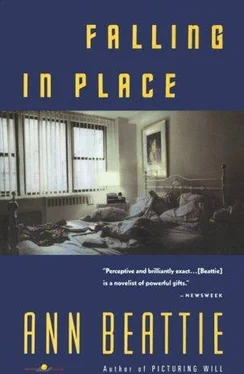Ann Beattie - Falling in Place
Здесь есть возможность читать онлайн «Ann Beattie - Falling in Place» весь текст электронной книги совершенно бесплатно (целиком полную версию без сокращений). В некоторых случаях можно слушать аудио, скачать через торрент в формате fb2 и присутствует краткое содержание. Год выпуска: 1991, Издательство: Vintage, Жанр: Современная проза, на английском языке. Описание произведения, (предисловие) а так же отзывы посетителей доступны на портале библиотеки ЛибКат.
- Название:Falling in Place
- Автор:
- Издательство:Vintage
- Жанр:
- Год:1991
- ISBN:нет данных
- Рейтинг книги:4 / 5. Голосов: 1
-
Избранное:Добавить в избранное
- Отзывы:
-
Ваша оценка:
- 80
- 1
- 2
- 3
- 4
- 5
Falling in Place: краткое содержание, описание и аннотация
Предлагаем к чтению аннотацию, описание, краткое содержание или предисловие (зависит от того, что написал сам автор книги «Falling in Place»). Если вы не нашли необходимую информацию о книге — напишите в комментариях, мы постараемся отыскать её.
Falling in Place — читать онлайн бесплатно полную книгу (весь текст) целиком
Ниже представлен текст книги, разбитый по страницам. Система сохранения места последней прочитанной страницы, позволяет с удобством читать онлайн бесплатно книгу «Falling in Place», без необходимости каждый раз заново искать на чём Вы остановились. Поставьте закладку, и сможете в любой момент перейти на страницу, на которой закончили чтение.
Интервал:
Закладка:
Mary’s eyes were closed. Mrs. Patterson, seeing that they were, allowed herself to look directly at John. She moved her head, telling him silently that he should go away from the bed. He moved back, cocked his head. She was lying there, suddenly asleep. People got heavier when they were unconscious. He remembered carrying her, when she was a child, taking her along with them when they had dinner with friends, putting her down to rest in the friend’s bed, then picking her up again and taking her home, dead weight pressed against him. The awkwardness of it, the way all her weight seemed to be concentrated in the middle of her body: Her arms and legs were so light they dangled and flapped. Inadvertently she would kick. As she got larger, her foot hit against him, kicking him in the balls. He knew she would not kick in her sleep, but still he would hunch forward, warding off the pain, and as he hunched she would slip down farther and farther. He had been awkward in a lot of ways. He had been awkward about leaving, coming back the way a drunken guest returns, apologizing, for a sweater, and then for a wallet, everyone knowing the person is drunk, the person wanting to appear only forgetful. He had wanted to appear sensible, and they had all known that what he was doing did not make sense. There had been the excuse of his mother’s illness, but when that passed it was so awkward that he did not go back. He could not go back, because for a long time, for years, he had felt like a guest, like someone who could only go so far, and then have to stop: feet on the footstool, but not tucked under you on the chair; a long soak in the bathtub, but then you had to scrub the ring away; a plant to be admired, but how could you know how much water it needed? Everything was being taken care of. He was visiting. He even had the manners to bring flowers, occasionally. A bottle of wine. He knew the things they liked, and they knew what he liked. It could have gone on. If it had, things might even have changed. It could have gone on like a reel of movie film spinning, but he started to get dizzy, to lose his breath. He started to edge away, delicately, as delicately as he could. Like shaving with a safety razor — you could only do it so delicately. You could know the strokes, the feel of the blade on the skin, just how much lather to put on; but still the skin would pull an unexpected way, a microscopic imperfection of the blade would result in a nick. He had told Louise, shaving, that the move was going to be permanent for a while. That was the way he had said it — awkwardly, like some bumbling child. An adolescent, cutting himself shaving. Lies: because he couldn’t stand the commute; because his mother needed him, even if she wasn’t dying. A trickle of blood had come up through the lather — a little cut he hadn’t even felt. “Do you want me to feel sorry for you?” she had said. She had not moved off the side of the tub, where she sat. She had watched him continue shaving, watched him hold the styptic stick to his cheek, cursing that it wasn’t working and he was in a hurry. He suddenly remembered what she had said to him: She had come up behind him, put her arms around him, and said, with her head buried in his back, “You hate blood, don’t you?” She was right. She knew him very well. And she was clever, too. Because she had not been talking about blood.
He had not rinsed the washcloth well enough. The razor wasn’t put carefully on the back of the sink, but dropped on the small table among her make-up. He was a bad guest. The guest who brings flowers, then gets drunk and chews off the heads. When he left, and didn’t come back for two weeks, he had been such a coward that he had sent tulips. Then guilt caught up, and he began the weekend visits. Then his son shot his daughter. In between, there was life with his mother and Brandt, life with Nina, working with Nick, dealing with Metcalf. And then his son had shot his daughter.
Leaving Mary’s room, he went to the phone booth. He was about to call Nick, when he realized that he couldn’t remember what he wanted to talk to him about. He was standing there, dime in hand, trying to think, when Mrs. Patterson came toward him, carrying his raincoat.
“Thanks,” he said. “I knew I’d forgotten something.”
When she turned to go back to Mary’s room, he continued to stand by the phone, holding the raincoat. The weather. People called other people and talked about the weather. He would call Nick and talk about the weather, the thunder outside the hospital, and it would come to him why he had tried to reach him before.
Nick answered.
“It’s raining like hell here,” he said. He waited. He tried to think. He thought: I would have walked out into the rain and never remembered bringing my raincoat. Maybe I would have remembered. Gone back. He had tested himself a lot of times, and as little as he thought he could stand it, he was always able to walk into Mary’s room. Over and over.
“Do people die from guilt?” he said to Nick.
“No,” Nick said. “They die from being interrupted when they’re screwing, because some nut calls to talk about the weather. Call me back in half an hour.”

From his car in the parking lot, he looked back at the hospital. The thunder had stopped, and it was raining lightly. He counted fourteen windows up, and looked across to the window he thought might be Mary’s. It was just a dark square, high up .
Metcalf had heard about what happened somehow, and he had come into his office and sat down without saying anything, picked up the Nantucket picture from the desktop and studied it .
“What can I say?” Metcalf had said. “The truth is, everything shocks me. I couldn’t believe what happened between my wife and Jenny last summer. This summer, I can’t believe what’s happened to you . A man in the elevator this morning that I didn’t even know told me a joke about an eggman delivering eggs to a convent that shocked the hell out of me. What if I had been a Catholic? There are still Catholics, aren’t there?”
“What was the joke?” he said .
“Never mind what the joke was. It was filthy. You wouldn’t laugh at it. You probably need a laugh, though. I was going to come in and tell you some other joke, but I don’t have a joke in my head today.” He put the picture back in place. “I came in to offer to do anything, if there’s anything I can do. How’s your daughter?”
“She’s going to be all right.”
“Good.” Metcalf pushed himself up straight in the chair. “Anything I can do?”
“No. Thank you, though.”
“What could I do, huh? I could do something, but it wouldn’t have much to do with your daughter or her being—” Metcalf bent over, pulled up his pants leg, tugged his black sock higher. “Her being shot,” he said. He pulled down his pants leg. “I’m giving you a raise,” he said .
“You are? What kind of a raise?”
“Whatever raise you want,” Metcalf said, and got up and went out. “Be reasonable about it,” Metcalf called back, going down the hallway. He said something else that John didn’t catch .
Nina had made that crack about his not supporting her, about having to go to work because she didn’t have somebody to take care of her. What would she think, now, about the way he had taken care of Louise and his family? Did she still think that he would be a good father?
Louise had parked her car far down in the lot, and didn’t see him. He watched as Louise and Tiffy walked through the lot and across the one-lane road that separated the parking lot from the hospital. Tiffy was always with her, never even an arm’s-length away. They walked at the same pace, step for step. He watched their backs disappear through the tall glass doors, into the lobby of the hospital .
Читать дальшеИнтервал:
Закладка:
Похожие книги на «Falling in Place»
Представляем Вашему вниманию похожие книги на «Falling in Place» списком для выбора. Мы отобрали схожую по названию и смыслу литературу в надежде предоставить читателям больше вариантов отыскать новые, интересные, ещё непрочитанные произведения.
Обсуждение, отзывы о книге «Falling in Place» и просто собственные мнения читателей. Оставьте ваши комментарии, напишите, что Вы думаете о произведении, его смысле или главных героях. Укажите что конкретно понравилось, а что нет, и почему Вы так считаете.












